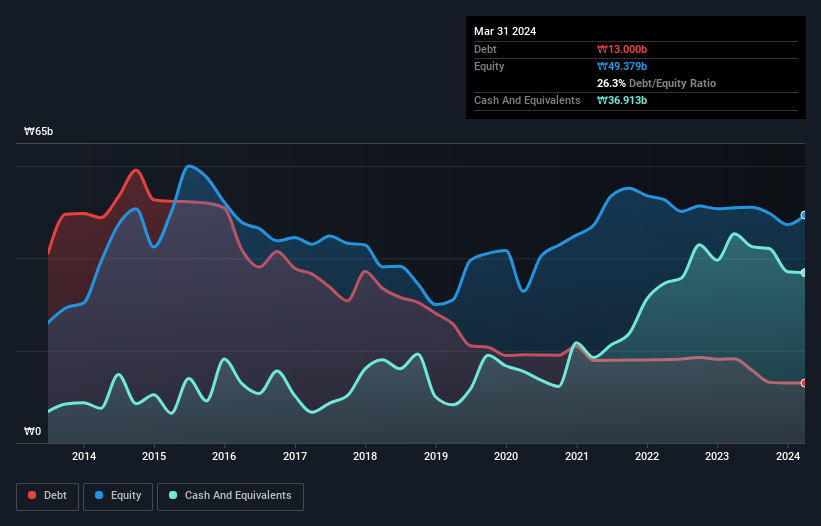
David Iben put it well when he said, 'Volatility is not a risk we care about. What we care about is avoiding the permanent loss of capital.' So it seems the smart money knows that debt - which is usually involved in bankruptcies - is a very important factor, when you assess how risky a company is. Importantly, SPECO Ltd. (KOSDAQ:013810) does carry debt. But the more important question is: how much risk is that debt creating?
When Is Debt A Problem?
Debt assists a business until the business has trouble paying it off, either with new capital or with free cash flow. If things get really bad, the lenders can take control of the business. However, a more frequent (but still costly) occurrence is where a company must issue shares at bargain-basement prices, permanently diluting shareholders, just to shore up its balance sheet. By replacing dilution, though, debt can be an extremely good tool for businesses that need capital to invest in growth at high rates of return. When we think about a company's use of debt, we first look at cash and debt together.
See our latest analysis for SPECO
How Much Debt Does SPECO Carry?
The image below, which you can click on for greater detail, shows that SPECO had debt of ₩13.0b at the end of March 2024, a reduction from ₩18.2b over a year. However, it does have ₩36.9b in cash offsetting this, leading to net cash of ₩23.9b.

How Healthy Is SPECO's Balance Sheet?
We can see from the most recent balance sheet that SPECO had liabilities of ₩26.7b falling due within a year, and liabilities of ₩13.4b due beyond that. On the other hand, it had cash of ₩36.9b and ₩2.79b worth of receivables due within a year. So these liquid assets roughly match the total liabilities.
Having regard to SPECO's size, it seems that its liquid assets are well balanced with its total liabilities. So while it's hard to imagine that the ₩60.5b company is struggling for cash, we still think it's worth monitoring its balance sheet. Despite its noteworthy liabilities, SPECO boasts net cash, so it's fair to say it does not have a heavy debt load! There's no doubt that we learn most about debt from the balance sheet. But it is SPECO's earnings that will influence how the balance sheet holds up in the future. So when considering debt, it's definitely worth looking at the earnings trend. Click here for an interactive snapshot.
Over 12 months, SPECO made a loss at the EBIT level, and saw its revenue drop to ₩20b, which is a fall of 26%. That makes us nervous, to say the least.
So How Risky Is SPECO?
By their very nature companies that are losing money are more risky than those with a long history of profitability. And we do note that SPECO had an earnings before interest and tax (EBIT) loss, over the last year. And over the same period it saw negative free cash outflow of ₩3.4b and booked a ₩2.6b accounting loss. With only ₩23.9b on the balance sheet, it would appear that its going to need to raise capital again soon. Overall, we'd say the stock is a bit risky, and we're usually very cautious until we see positive free cash flow. There's no doubt that we learn most about debt from the balance sheet. But ultimately, every company can contain risks that exist outside of the balance sheet. These risks can be hard to spot. Every company has them, and we've spotted 2 warning signs for SPECO (of which 1 can't be ignored!) you should know about.
At the end of the day, it's often better to focus on companies that are free from net debt. You can access our special list of such companies (all with a track record of profit growth). It's free.
New: Manage All Your Stock Portfolios in One Place
We've created the ultimate portfolio companion for stock investors, and it's free.
• Connect an unlimited number of Portfolios and see your total in one currency
• Be alerted to new Warning Signs or Risks via email or mobile
• Track the Fair Value of your stocks
Have feedback on this article? Concerned about the content? Get in touch with us directly. Alternatively, email editorial-team (at) simplywallst.com.
This article by Simply Wall St is general in nature. We provide commentary based on historical data and analyst forecasts only using an unbiased methodology and our articles are not intended to be financial advice. It does not constitute a recommendation to buy or sell any stock, and does not take account of your objectives, or your financial situation. We aim to bring you long-term focused analysis driven by fundamental data. Note that our analysis may not factor in the latest price-sensitive company announcements or qualitative material. Simply Wall St has no position in any stocks mentioned.
About KOSDAQ:A013810
SPECO
Manufactures and supplies asphalt plants for use in the road construction in South Korea and internationally.
Adequate balance sheet very low.
Similar Companies
Market Insights
Community Narratives



